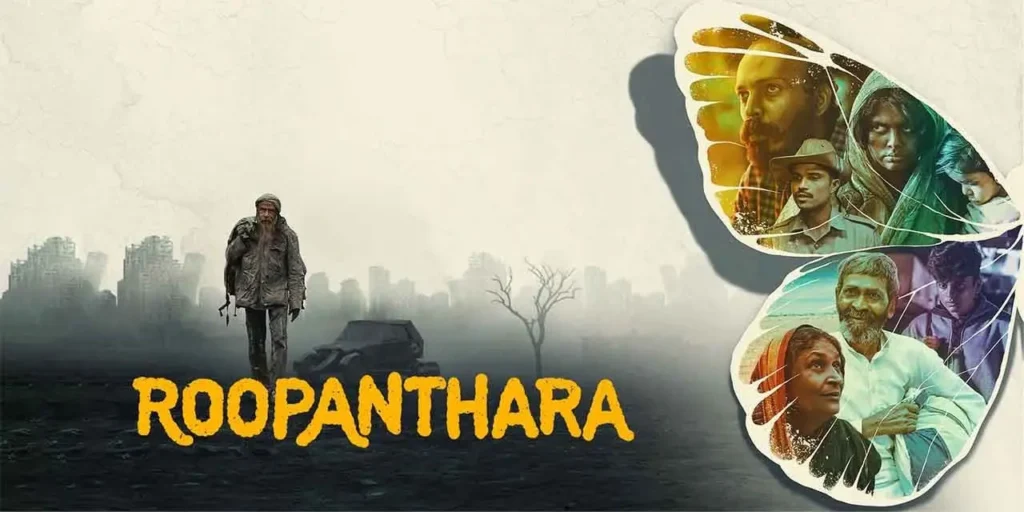The number of plot threads may make the film sound like some sort of anthology, but it’s more like a series of slow-burning fuses leading to an existential firecracker that explodes with a big bang.
In the Arabian Nights, the king made his queen Scheherazade tell him a new story every day if she wanted to stay alive. And she spun fantastical and magical tales of flying carpets and genies and forty thieves who hoarded their loot in a password-protected cave. Mithilesh Edavalath’s Roopanthara operates on a premise that’s similar, yet different. Here, too, we have someone who spins tales to save their life: this time, it’s an old man in a dystopian future where people wear masks (must be the air), and water packets are some sort of currency. And just like the king whose whim made his wife tell him those tales – because he had the power! – we have some men with guns who, on a whim, pick this old man for execution and offer not to kill him if they like his tales. But the tales themselves are different.
Instead of Scheherazade’s spectacular stories, we get to hear about the most ordinary people. We hear about an old farmer and his wife who visit the big city for the first time. We hear of a ruffian whose short fuse gets him into a bizarre fight. We hear of a dysfunctional young man who carries out dangerous “tasks” from someone who appears on a computer: it’s some kind of game. And we hear of a beggar woman who is suspected of abducting a fair-complexioned child on her hips. What links all these stories is the philosophy that, in the life we are given, we get to be a butterfly or die a worm. Which option we choose is up to us. It sounds like a heavy-handed moral-science lesson, but the delicately directed Roopanthara is one of the most moving, most exquisite films I have seen this year.

The number of plot threads may make the film sound like some sort of anthology, but it’s more like a series of slow-burning fuses leading to an existential firecracker that explodes with a big bang. The deliberate pacing is necessary because these stories can be told no other way if their full emotional impact is to be realised. Take the scene with the beggar woman and a young cop, which takes place outside the police station. Without a word, you get a sense of her confusion. She is not used to kindness, and she is rooted to the spot, unable to decide what to do. The scene is not milked for sentimentality. On the other hand, you have an upper-class army man who complains about the squatters outside his posh apartment complex. This situation is echoed in the dystopian future, where a makeshift army shows that things are only going to get worse.
Roopanthara has a crack team of actors. Raj B Shetty (who is credited with additional writing) plays a violent goon who ends up becoming a victim of his anger. In a curious development, he ends up curled in a foetal position. Lekha Naidu is superb as the beggar woman. Soma Shekhar Bolegaon and Hanumakka are a farmer couple, and they face a devastatingly emotional end. Mithilesh Edavalath’s direction – especially his handling of the near-wordless passages – is superb. Some story threads work better than others, but they all underline the worm-butterfly thesis. And there’s no denying that the film slowly grows on you – rather, it slowly gets under your skin with the help of composer Midhun Mukundan’s two-note refrain. Roopanthara is an ode to the power of a story, and also to the power of good storytelling.




Pingback: Mithilesh Edavalath’s ‘Roopanthara’ is a philosophical multi-threaded quilt, whose stories shine with humanity in the best possible way | Baradwaj Rangan